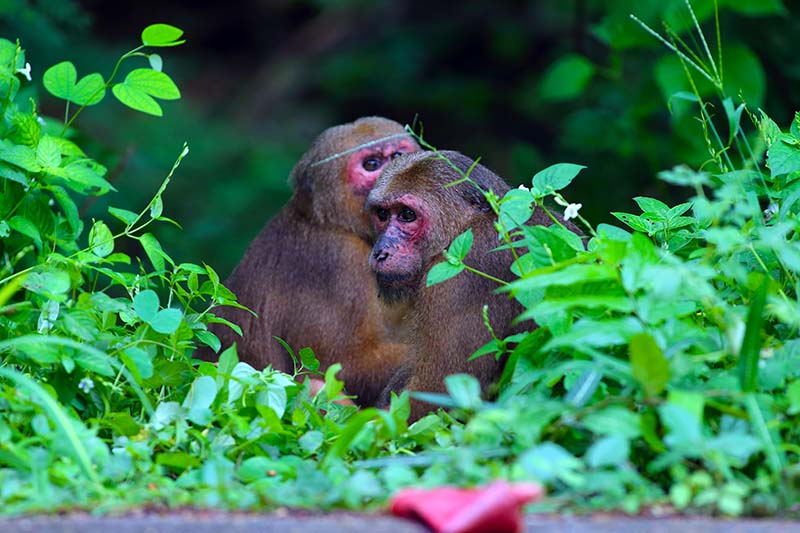2.5-minute read
Loss of habitat resulting from deforestation is one of the greatest threats to wildlife on the planet. In tropical forests alone, home to red pandas, lemurs, and pangolins—Bengal tigers, Asian elephants, and orangutans, researchers estimate that some 75,000 species have already been wiped out or doomed to extinction.
According to a study by the United Nations, we are losing approximately 10 million hectares of forest per year to land use change, and since 2001, an additional 3 million annually and counting to wildfires. The same forests that benefit humanity by cooling the atmosphere, capturing carbon pollution, filtering water, and supporting livelihoods provide habitat for 68 percent of the world’s mammals, 75 percent of bird species, and 80 percent of amphibians.
Beyond the lovely-to-look-at value of iconic creatures, each of the one million species now at risk represents a thread in the web of life that helps to keep ecosystems that we depend on functioning as nature intended. Half of the 85% of at-risk species threatened by loss of habitat live in rainforests, and that’s why restoring and protecting tropical landscapes is critical to their survival and to the health of the planet.
We Plant Trees Where the Wild Things Are
Through our partnership with Tree-Nation, we’re grateful to have the opportunity to support forest conservation with organizations like the Eden Restoration Project, planting trees in some of the world’s most remote locations that not only restore habitat for endangered wildlife but help to improve the living conditions of local communities. Places like Madagascar, home to nine species of lemurs, with only 10% of native forests remaining, and Nepal, where Bengal tigers, Asian elephants, and red pandas roam and forests have been diminished by 70%.
By educating rural populations on the benefits of maintaining the environment they live in, Eden is helping to preserve wildlife habitat through community-based tree-planting projects that generate long-term, social, economic, and biodiversity benefits. Empowering people to care for nature by restoring and protecting forests will help to ensure that the last places on Earth where the wild things are will continue to exist. Thank you for helping us help them re-habitat.

ICYMI Nature News
Jellyfish Learn Without Brains
According to new research, jellyfish don’t need grey matter to acquire knowledge. The gelatinous sea creatures can learn from past experiences through neurons in their eye structures. Read about it here.
Silkworms Can Out-Spider Spiders
Through the process of gene editing, scientists have enabled silkworms to replicate the bulletproof silk of spiders. No copyrights for spiders, apparently.
Rhinos are on the Rebound
On the conservation yay front, finally, some good news for rhinos. According to the IUCN, global numbers of the critically endangered animals have reached 27,000. More work to be done to reach the 20th-century pinnacle of 500,000, but it’s an encouraging milestone.
Maui Banyan Tree Keeps on Treeing
After the devastating August wildfires, the iconic 150-year-old Maui Banyan tree is sprouting new leaves—a hopeful testament to the resilience of nature.
Thank an Earthworm for Your Loaf
Never underestimate the importance of earthworms. A new study has revealed that the little wrigglers going about their earthworm business significantly boost wheat yields, adding one slice to every loaf—that’s 140 million tons a year to the global food supply.
Behold the Dumbo Octopus
The rare ghostly deep-sea creature was spotted in an expedition off the coast of Hawaii, and you can see it here. Beautiful!
Who’s the Fattest Bear of All?
Fire up your chooser, Fat Bear Week is from October 4 through October 10. You can cast your vote for the most proficient salmon scarfer in Katmai National Park right here. We’re liking the looks of Chunk—now that’s a power eater if ever we’ve seen one.
Dolphin Drones in NYC
Climate Week NYC may be over, but you can still see 1,000 drones light up the skyline in support of the Amazon rainforest, courtesy of Avaaz.
FWP Carbon Capture Report
For people and for wildlife, here’s the Favorite World Press carbon capture update from April 2022 through August 2023. From April 2022 through September 2023, the trees that we’ve planted across 13 projects in 12 countries bring our carbon capture to 4076 tons of CO2. That’s the equivalent of 4,566,261 pounds of coal burned, 10,450,204 miles driven by an average gasoline-powered passenger vehicle, and 458,699 gallons of gasoline consumed.




















































